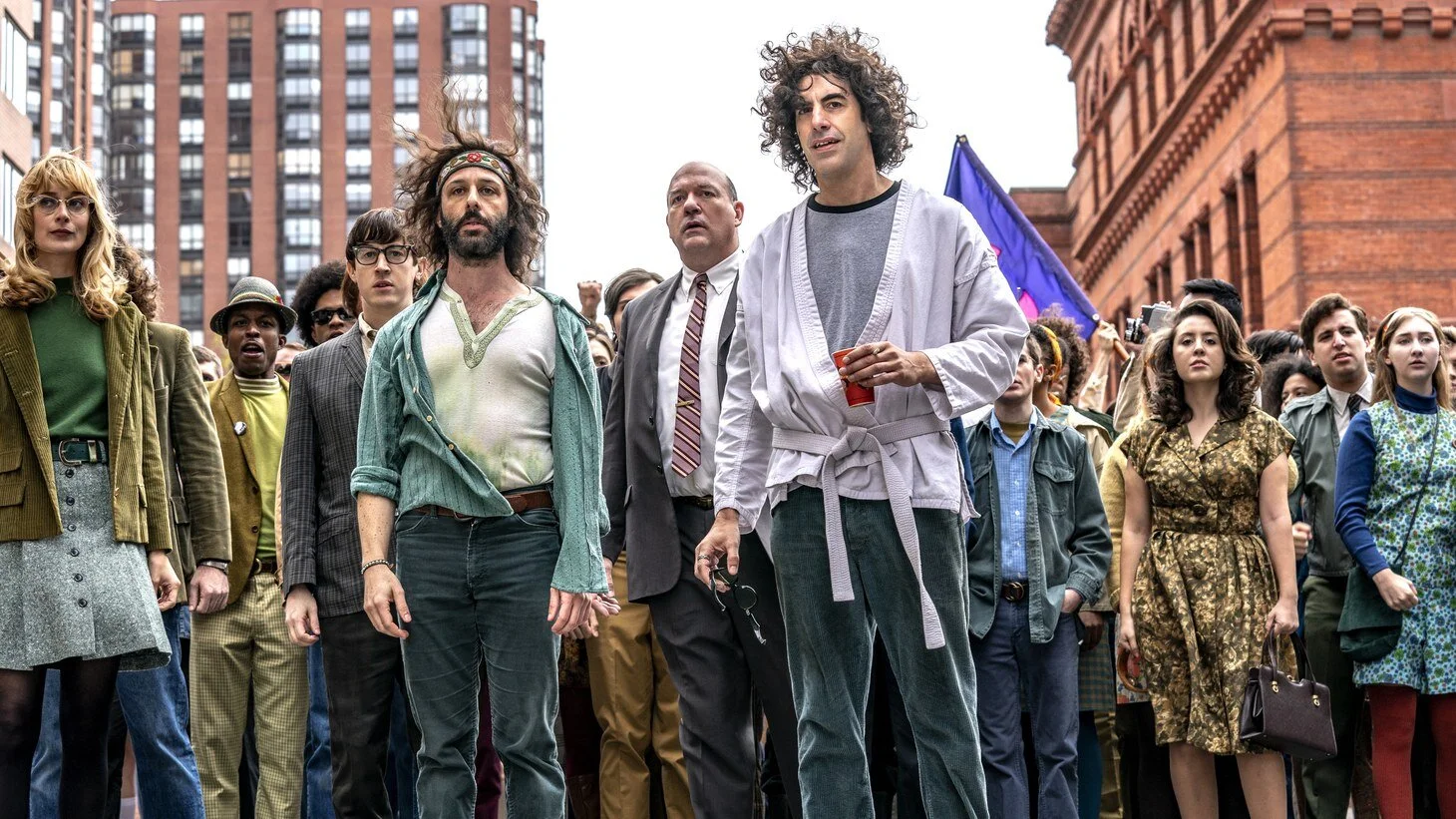FILM REVIEW: Aaron Sorkin returns to form with powerfully charged “The Trial of the Chicago 7”
Within the political climate of a world that survived a Donald Trump presidency and all that it entailed, the impact of the quintessential courtroom drama is something not to be underestimated. It is a delicate balancing act; tread too closely to chasing pure entertainment value, and you run the risk of trivialising the flaws in America’s justice system for quips and laughs.
But ‘The Trial of the Chicago 7’, an original Netflix movie directed by the renowned courtroom drama aficionado (see: A Few Good Men, The Social Network, Molly’s Game) Aaron Sorkin seems to have perhaps located a sweet spot. It finds levity while propelling a powerfully charged message; inspiring unity whilst reminding us of the corruption ever-present in America’s courtroom.
From the get-go, Sorkin (who is taking on both directing and screenwriting duties) throws us into the colourful and exhausting chaos that was once the 1960’s; the age of the Vietnam War, and the assassination of two sitting Presidents clustered together in merely a decade. Nixon’s reign and resistance to ending the war seemed to mark an imminent shift; a collective crusade by the American people towards protest culture and advocating for civil rights.
Based on the 1969 case, the film centres around the prosecution of 8 Vietnam War protestors – Abbie Hoffman, Jerry Rubin, Tom Hayden, Rennie Davis, David Dellinger, Lee Weiner, John Froines and Bobby Seale (Sacha Baron Cohen, Eddie Redmayne, Alex Sharp, Jeremy Strong, John Carroll Lynch, Noah Robbins, Daniel Flaherty and Yahya Abdul-Mateen II respectively); all targeted due to their involvement in organising what was meant to be a peaceful protest for thousands at the 1968 Democratic National Convention in Chicago. Considered national security threats by the Attorney General, the supposed rebels are set to face trial - despite the fact that some of the group have never shared a single interaction.
The trial unfolds with painful frustration.- Adjudicated by the hostile and bigoted Judge Hoffman, who lops constant microaggressions at the only black defendant of the group, leader of the Black Panthers Bobby Seales, and demonstrates a gross lack of understanding for his own courtroom’s proceedings.
The first half of the film is where Sorkin’s signature style shines through, a playfulness injected with his dialogue-laced, quick-witted walk-and-talks making appearances early on. Hoffman and Rubin, played by the charismatic Sascha Baron Cohen and the stoic Jeremy Strong, work as a stellar combination in this arena up against the sheepish stature of Joseph Gordon Levitt, who plays prosecutor Richard Schultz. We can thank their chutzpah in mediating the dulled, repetitive nature of the trial – both leveraging the courtroom as something of their own personal comedy shows, baiting and dangling the riots in the face of Judge Hoffman.
The narrative tone becomes markedly more somber in the second half of the film, with a particularly poignant performance laying in the lap of Yahya as Seales. The privilege of the remaining defendants is impossible to ignore, as the trial provides a chilling reminder of how due process truly looks like for an African American man in the 1960’s. Bobby Seale’s treatment in court holds even more gravity when considering the real-life events that did not need dramatization in the film. Yahya’s deliverance of these moments in the trial that rendered the entire court speechless is one that brings shivers to your skin; the type that makes your heart catch in your chest.
The lens of these hopeful revolutionaries helps delve into the ways they navigate the legal institutions they are propped up against. Polarly positioned against the quirks of Hoffman and Rubin and the pleads of Seale is seemingly quiet follower Tom Hayden (Eddie Redmayne), who is also forced to grapple with choosing whether to honour his integrity or the institutions he is bound by. The film demands choices to be made by every defendant – the choice of which side of history they choose to be on, despite the fears and dangers they may face.
Sorkin’s proclivity to quick wit and back-and-forths is hard to fault when it’s packed of sheer entertainment, boasting a magnetic cast, exhilarating discussions and the gritty and authentic cinematography capturing the pandemonium of the Chicago protests. But this doesn’t completely take away from the sense of urgency The Trial of The Chicago 7 pushes in the fight towards justice, with its stylish depiction of a historical protest and its aftermath drawing eery similarities with the wave of global Black Lives Matter protests that took place this year.
Punchy and earnest all in the same breath, The Trial of The Chicago 7 is a dazzling courtroom drama that plates up an entertaining yet sobering reminder of the pitfalls of the American legal system, bolstered by the heart of Sorkin’s wisecrack approach.
3.5 out of 5 stars






